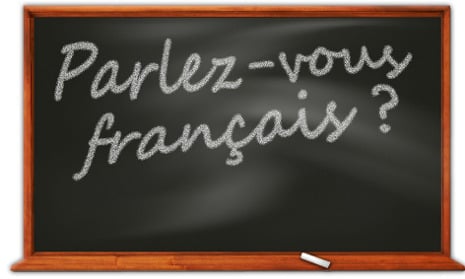
LANGUAGE AND CULTURE
Why we’re all rubbish at speaking French
France has been ranked the worst in the EU for their English ability, but let's face it, they still speak English better than we speak French.
Published: 15 November 2016 18:16 CET

Photo: Pixabay
France ranked absolute last in the EU in an English proficiency ranking on Tuesday.
I can just about hear the laughter of the Luxembourgers, the snorts of the Swedes, and the howls from the Herzogovinians from their lofty places above France on the list.
And English speakers in France were quick to share their thoughts too.
One of The Local's Facebook followers wrote:
“Thank you France. That fact that you're totally inept at English has provided me with a prosperous career which has supported my family, financed my house, paid for my car and funded my healthy alcohol intake for years.”
But while the French may rank among the worst at English, let's be honest it should be us English speakers who cop a bit of flak for our lousy French.
While we're at it, why are we all so bad at French?
It's one of the most popular languages in the entire world for a start.
And so much of English comes from French, so surely it shouldn't take much to speak it fluently?
Here are a few reasons why we struggle.
1. C'est très difficile
French is a really tricky language to learn, especially for someone who can only speak English.
Just at a beginner level, you have to learn some fundamental differences like gendered nouns, formal and informal pronouns, verb agreements, pronouncing liaisons, and don't even get me started on the unusually common subjunctive tense.
And when you've finally wrapped your head around it all, you have to think about your rhythm and accent if you plan to ever be understood.
Sure, some people can learn it quickly, but for most people it's a lifelong challenge to really master.
2. We just don't have access to French
Even in the deepest, darkest corners of Africa you can find copies of Hollywood movies or Michael Jackson music. But ask around for an Edith Piaf CD or a copy of Bienvenue Chez Les Ch'tis (the highest grossing French film of all time) and you'll be met with shrugs.
The spoken (and sung) French word just hasn't left an indelible mark on the world as English has (though that doesn't mean there aren't excellent films to check out, I'd recommend you start here. Or here).
English speakers just don't have access to French from day one, whereas foreigners learning English will see it from when they are toddlers. And that's the best time to learn it, when their petite brains are like sponges.
3. We just don't need it/We got lucky
We can always blame our bad French on our one (quite legitimate) excuse – there's no real need to learn it.
English speakers are a fairly job-orientated bunch, and learning French isn't pre-requisite for getting a job these days. But luckily for us, speaking English is.
For reasons that we don't have the time or desire to go in to, English has become the dominant language around the world. At least for the moment.
Until that changes, we'll probably never get good at French or any other language.
4. French isn't important anymore
It used to be the language of Europe, the language of diplomacy, and the one foreign language you had to learn in school. But nowadays, kids are more likely to be learning Spanish – especially in the US – or even Mandarin.
The only time you hear French these days is at the Olympic Games or at the Eurovision song contest – although even at these events the French language appears to be fading away.

Conchita from the Eurovision Song Contest. Photo: AFP
5. The French people you actually meet speak English well
If you're a tourist in France, or a new arrival, the chances are you'll come across mostly people who can speak English pretty well. Especially in the big cities and tourist areas.
Sure, this isn't a real reason as to why we're all rubbish at French, but it doesn't help people coming to France with the hopes of a bit of practice.
Url copied to clipboard!





 Please whitelist us to continue reading.
Please whitelist us to continue reading.
Member comments